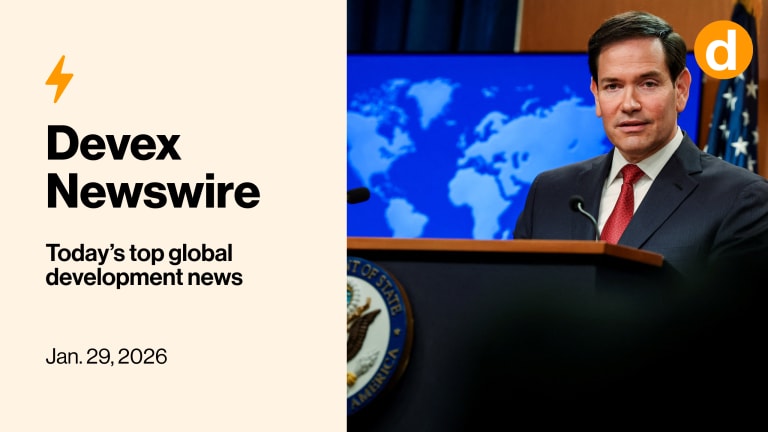
WASHINGTON — The United States has not ruled out imposing oil sanctions on Venezuela, National Security Council Senior Director for Western Hemispheric Affairs Juan Cruz said Friday.
“We haven’t taken anything off table. The president is very clear: We will leave all options open,” Cruz said of the Trump administration at an event at the Council of the Americas in Washington.
“We will be as creative as we have to be.”
Following Sunday’s Venezuelan presidential election, which much of the international community condemned as a sham, the U.S. on Monday imposed new sanctions on some individuals and aspects of the Venezuelan economy. It has thus far avoided sanctioning the country’s oil industry out of concern for the impact it would have on civilians — who already cannot find basic goods such as food and medicine — and instead focused on sanctioning government officials and entities suspected of abuse.
“One of the things we always look at when we debate is what kind of effect this could possibly have on the Venezuelan people,” Cruz said.
The Trump administration also hasn’t given up on getting humanitarian aid into Venezuela, Cruz said. Caracas currently blocks international assistance, so the vast majority of dollars flowing to the response are being funneled to address border crises in Colombia and Brazil caused by fleeing migrants. Earlier this month the U.S. pledged $18.5 million in assistance to Colombia, in addition to the more than $21 million that had previously been pledged for overall response to the situation.
“The reason that aid isn’t getting in isn’t because aid is not being offered. There’s plenty of humanitarian assistance out there.”
— Jennifer Loten, Canada’s ambassador and permanent representative to OAS“We will try ways to get food aid to [Venezuela] despite the repeated resistance by the regime to accept that they’re in need of food, and to reject all the offers that have been made for humanitarian aid and food aid by a whole host of countries,” Cruz said.
He did not elaborate on what methods the U.S. may be considering to get much-needed supplies into the country, which is expected to see inflation rates of 13,000 percent this year.
An estimated 50,000 people are crossing the border into Colombia each day to access basic necessities. An estimated 3,000-5,000 are staying in that country, while others intend to move on to other countries or return to Venezuela after earning money or obtaining food or medicine in Colombia. Colombia alone is hosting 750,000 Venezuelans by the official count, although unofficial estimates put the number closer to 1 million, according to Dany Bahar of the Brookings Institution.
Canada’s ambassador and permanent representative to the Organization of American States, Jennifer Loten, also condemned Venezuelan President Nicolás Maduro for exacerbating the suffering of his population.
“The reason that aid isn’t getting in isn’t because aid is not being offered. There’s plenty of humanitarian assistance out there,” Loten said. “The government of Venezuela continues to refuse to allow this.”
Eighty-seven percent of Venezuelans remaining in the country are impoverished, 24 million people suffer from food insecurity, and 86 percent of pharmaceuticals are not available inside the country.
Mark Fierstein, who served as senior director of Western Hemispheric affairs to former President Barack Obama and assistant USAID administrator for Latin America and the Caribbean, said U.S. aid is poised and ready to help those Venezuelans who have remained in their country as soon as it is allowed in.
“USAID has a warehouse in Miami. That food could arrive in Venezuela — food, medicine, and other supplies — could arrive in hours,” Fierstein said at an event at the Center for Strategic and International Studies.
“The Venezuelan people understand this. If their own government decides right now to accept humanitarian assistance, that food would be down there today, tomorrow.”
Loten called on the OAS to act more aggressively and “be courageous” when it comes to punishing the regime of Maduro’s treatment of his people. Ahead of the organization’s general assembly in June, she condemned OAS member states’ tendency to delay action against Venezuela over concerns of violating its sovereignty.
“We end up doing what we are all willing to do as opposed to what we all know we should do,” Loten said. “We need to consider the suspension of Venezuela in the context of the OAS general assembly.”
Cruz agreed that the international community needed to be more aggressive in its response to the humanitarian catastrophe and Maduro’s political manipulation of food aid.
“If these aren’t crimes against humanity, I don’t know what is, and the world’s going to hold them accountable for it,” Cruz said.








